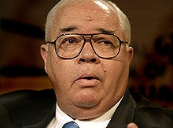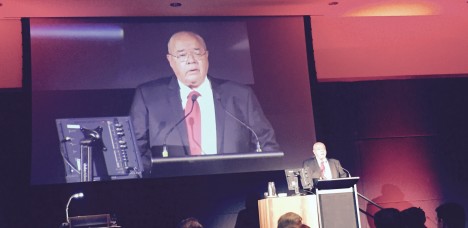Laurie Oakes – Complacent media needs to fight harder against threats to press freedom

Laurie Oakes
Nine’s veteran political editor Laurie Oakes has warned the Australian media that it has become complacent in fighting threats to press freedom.
Speaking at Melbourne’s first Press Freedom Dinner, organised by the Walkley Foundation, Oakes warned that the media had slipped up by allowing new national security laws to get onto the statute books without fighting harder against provisions which threaten open reporting. He also criticised media companies, including News Corp, for scoring points against competitors rather than uniting to fight the threat.

Oakes told the dinner: “For the last couple of years—until 10 days ago—we had an ex-journalist as Prime Minister and an ex-journalist as Communications Minister. Yet that period saw a number of pieces of legislation, primarily security-related, that clearly have the potential to inhibit public interest reporting.
“Some of the legislation was a direct threat to journalists themselves. Other measures threatened sources, or made it more difficult to protect the identity of confidential sources. Attack sources and you attack journalism.”
Oakes referenced three recent pieces of legislation:
- Section 35P of the ASIO Act – which covers disclosure of information relating
to Special Intelligence Operations and carries a five year prison term, which can be doubled if the disclosure is judged to be “reckless”; - The Foreign Fighters Bill which includes a loosely defined offence of “advocating terrorism”;
- The Data Retention Bill requiring telecommunication companies to keep metadata for at least two years so that it can be accessed agencies, including security organisations and the police and could be used to reveal sources.
Oakes said: “We tend to sit back and blame the Government for infringements on press freedom. We should also blame ourselves. I think we’d got complacent. When the
former Labor Government tried to impose new regulations on the media, the threat was obvious and we jumped up and down. This more recent stuff has been less obvious and cloaked by the need to counter terrorism.”
Oakes said that the laws went far further than protecting information about undercover operations, and could also be used to stop reporting of bungled cases, even long after they took place. He said: “Our security agencies have been involved in some spectacular stuff-ups in the past. Or what if there’s corruption? Or gross incompetence? Or an attempt to pervert
the course of justice? Under this law, no-one can report it.”
But he added: “If we’d gone into battle earlier, seriously and united, we might have got somewhere. We were too slow to recognise the threat. Too late, and probably too polite, in pushing back. ”
“It’s clear in retrospect that we should have been alarmed and trying to get some kind of protection for journalists and their sources much earlier. It’s been obvious for a very long time that the metadata threat to journalists’ confidential sources is the big press freedom issue of the internet age. We didn’t really need to wait for the metadata retention legislation as a catalyst. We only had to look at what was happening overseas, particularly in the US, to see what was coming in Australia.
“When the media eventually took up the cudgels, we didn’t get much—but we got something. The politicians were pushed into introducing a requirement for warrants before a journalist’s metadata can be accessed for the purpose of identifying a source.”
Oakes also criticised The Australian, saying the paper had initially come out in favour of the legislation and had attacked him for opposing it.
He argued: ” If we’re to achieve a proper balance, it’s also incumbent on journalists and publishers and broadcasters to fight for the press freedom side of the argument. ”
However, the arrival of Malcom Turnbull as Prime Minister improved the industry’s hopes of getting greater reporting protection, Oakes said.
“One reason I’m cautiously optimistic about what Turnbull’s elevation might mean in terms of the press freedom issue is that he understands the fundamental importance of clause 3 of the Journalists’ Code of Ethics: ‘Where confidences are accepted, respect them in all circumstances.’
“The new PM refers to the protection of confidential sources as ‘the journalist’s job’, an ‘obligation’ and a ‘duty’. He accepted that it was an important consideration in the data retention debate at a time when other ministers were calling it a red herring.”
But Oakes warned that journalists need to get the public back on their side. He concluded: “The only way to guarantee it is to start winning back respect. Rebuilding trust. That obviously involves lifting our game.”
- Mumbrella attended the Press Freedom Dinner as a guest of table sponsor ANZ Bank.

